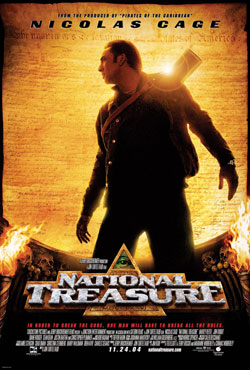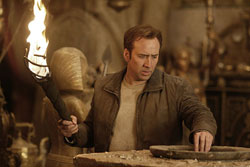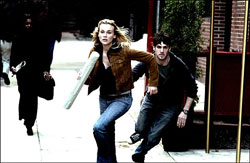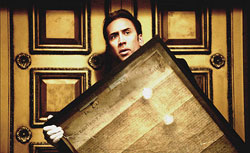 A sloppy mix of legend and half researched fact, yet another teaming between Nic Cage and Jerry Bruckheimer, a movie full of slow motion and blaring “excitement” music, National Treasure is exactly the sort of film I hate. But somehow, instead of finding myself gnawing at my ankle as the movie went on I was pleasantly surprised by a movie that covers its basic stupidity with some fun facts about American history that tickles a Revolutionary War fan like me pink.
A sloppy mix of legend and half researched fact, yet another teaming between Nic Cage and Jerry Bruckheimer, a movie full of slow motion and blaring “excitement” music, National Treasure is exactly the sort of film I hate. But somehow, instead of finding myself gnawing at my ankle as the movie went on I was pleasantly surprised by a movie that covers its basic stupidity with some fun facts about American history that tickles a Revolutionary War fan like me pink.
The film opens with the story of a great treasure, hoarded by the legendary Knights Templar, and secreted to America by the Freemasons. These scenes play out in flashbacks that look an awful lot like Walt Disney animatronic recreations, but they manage to get the movie off to a rollicking start that reminds you why the legends of brave knights and buried treasure piqued your interest when you were 9. Maybe it’s the blatant fakeness of the scenes that hearken back to what it was like to read shoddily drawn Classics Illustrated stories like Kidnapped and Treasure Island.
Fast forward to today – Cage is north of the Polar circle, accompanied by Sean Bean and his group of “How did you not know we’re heavies” players, seeking the key to the lost treasure of the Templars. Cage’s family has been searching for it for generations, ever since one of the signers of the Declaration slipped one of them a clue before dying. Sean Bean is a rich guy who has been funding the search for the last few years. They discover a clue that leads them to believe that the map to the treasure is hidden on the back of the Declaration of Independence. At this point Bean decides to steal it and tries to kill Cage and his annoying sidekick, Riley.
Cage decides to steal the Declaration first to protect it from Bean, they get mixed up with a pretty young archivist played by Troy’s Diane Kruger, and then Cage, Kruger and Riley go on a big treasure hunt through many of the national landmarks dedicated to the Founding Fathers, followed closely by Bean’s goons and the FBI, headed by Harvey Keitel (penis not on display).
 The movie’s stupid. There’s no way to get around that. This could easily turn into one of those reviews where I hilariously point out the plot holes and logical gaps – Sean Bean is a man of unlimited wealth who personally leads a group to steal the Declaration? Ben Franklin invented holograms? None of Sean Bean’s henchman have the aim that God gave Michael J Fox (I haven’t seen a movie with such poor marksmanship since Star Wars)? The Founding Fathers created a treasure room right out of Temple of Doom? I’m just getting warmed up. I haven’t even begun to talk about where Cage gets his funding or how ludicrously quick every puzzle is solved or –
The movie’s stupid. There’s no way to get around that. This could easily turn into one of those reviews where I hilariously point out the plot holes and logical gaps – Sean Bean is a man of unlimited wealth who personally leads a group to steal the Declaration? Ben Franklin invented holograms? None of Sean Bean’s henchman have the aim that God gave Michael J Fox (I haven’t seen a movie with such poor marksmanship since Star Wars)? The Founding Fathers created a treasure room right out of Temple of Doom? I’m just getting warmed up. I haven’t even begun to talk about where Cage gets his funding or how ludicrously quick every puzzle is solved or –
The thing is that the film managed to lift me above wondering about such stupid crap (with a couple of exceptions – more on that later) and had me just enjoying myself. A big part of that, I think, was the fact that the film was shot at great locations – The National Archives, the Lincoln Monument, the Library of Congress, Independence Hall, the USS Intrepid, Trinity Church – that I was, as a US history nerd, just far too psyched to care. And while the history trivia in the film is strictly on a third grade level, it’s still more American history than I have seen in a film since 1776.
Also, Cage is surprisingly likable here. His character of Benjamin Franklin Gates is a historian more than an adventurer, so he has that Indiana Jones vibe (which gets so explicit at the end that I honestly think the film enters lawsuit territory). He’s a nice guy hero, who really cares about history and who apologizes to the sidekick when he yells at him. Sean Bean is excellent as the villain – why can’t this guy get a really good role? I mean, I loved him as Boromir and in a number of other things, but he’s always the guy who dies or something – I know everyone reading this knows who he is, but I wonder what weight his name carries in the non-geek world.
The rest of the cast is adequate. Kruger’s character could only be extraneous if she was Judi Dench in Riddick – you know that her whole point is to give Cage someone to kiss later on in the film, and because Cage’s character is the Rain Man of American history, cryptography, riddles, heists, etc etc etc, she has nothing to do but tag along. Also, she’s annoyingly German – all the bad guys are set up as Brits, but the Hessians fought on the side of the Queen. She should have been French, but nobody likes the French anymore, so there you go. Relative newcomer Justin Bartha is Riley, the computer geek whose real purpose is to play Short Round to Cage’s Indy – he’s mostly harmless, and Bartha has some good line readings on the character’s incessant patter, but he’s a character caught between types. Riley knows an awful lot about stuff when the movie needs it, but otherwise he’s the audience identification character that gives Cage the opportunity to reel off some grade school civics stuff.
Jon Voight plays Cage’s dad, who gave up on the hunt for the treasure long before. Tell me if you find this scenario familiar: An adventurous treasure seeker is on the trail of the artifact that consumed his dad’s life. Together they find it and come to an understanding that repairs their relationship. If you didn’t figure that out on your own, director Turteltaub dresses Cage in the Urban Outfitters Indiana Jones Collection for the second half of the movie.
their relationship. If you didn’t figure that out on your own, director Turteltaub dresses Cage in the Urban Outfitters Indiana Jones Collection for the second half of the movie.
As a director Turteltaub has a fine cinematographer. All too often he gives in to useless slo-mo shots and camera speed tricks; the movie usually looks like a generic Bruckheimer action picture, even thought it’s got a lower than normal action quotient. Caleb Deschanel, of The Passion of the Christ, does the camera honors here, and he captures some really beautiful shots of some of the more inspiring places where history took place in this country.
The only thing really original about National Treasure is the setting – the first half of the film is a James Bond bit including an opening action scene and an elaborate, tux-clad heist. The second half quickly becomes an Indiana Jones picture, set in the Northeast. But it’s that setting – even when it’s implausible, like a five story deep chamber beneath Broadway and Wall Street – that gives the film some juice. We’re used to this kind of a treasure hunting picture being set in a foreign and ancient land, so it’s fun to see the local stuff get spotlighted.
This is the part of the review where I indulge my inner history nerd, so stick with me. If you really can’t stomach nitpicking about the finances of the colonies during the Revolutionary War, skip down to the last paragraph. But if you can, you’ll understand why I was so wary of this film from the start – the very premise is that the Freemasons smuggled the greatest treasure in history to the New World, and the Founding Fathers knew about it and hid it from the British during the war. This makes NO sense, since the rebelling colonies were in such deep financial shit during the war that we almost lost it because the army had no shoes. One imagines that if Washington knew of the location of a few billion in treasure he might have sought to get enough to cover footwear. It’s also radically dumb to imagine that after the war, which they pretty much all survived, they would just leave the treasure to fester.
But they make up for the stupidity of that concept: every character’s name calls back to a Revolutionary figure: The archivist Abigail Chase is named after John Adams’ wife; Benjamin Franklin Gates, besides the obvious reference, gets his name from Horatio Gates, the General who accepted the British Army surrender at the Battle of Saratoga in 1777; Sean Bean’s Ian Howe is named for General Howe, who led the British Army for much of the war; actually the two names I can’t properly place are Riley Poole and Keitel’s Sadusky – any Revolutionary buffs want to get me information on that?
 Also, National Treasure is a glaringly white movie. I know that colonial America was pretty honkyfied, but except for a little black student and a bad guy of indeterminate skin tone, the movie’s white, white, white. It led me to think about the basic dichotomies of the Revolutionary generation – wealthy men living in the freest and best off colony in the history of the world fighting for their freedom from taxes that were so marginal as to be laughable, battling for liberty for everyone except blacks, women, non-Christians and the poor, believing in “We the people” but setting up an electoral system that keeps the people from having too big a say in anything – these things are endlessly fascinating to me, but I somehow doubt the film MEANT to have me ponder this stuff.
Also, National Treasure is a glaringly white movie. I know that colonial America was pretty honkyfied, but except for a little black student and a bad guy of indeterminate skin tone, the movie’s white, white, white. It led me to think about the basic dichotomies of the Revolutionary generation – wealthy men living in the freest and best off colony in the history of the world fighting for their freedom from taxes that were so marginal as to be laughable, battling for liberty for everyone except blacks, women, non-Christians and the poor, believing in “We the people” but setting up an electoral system that keeps the people from having too big a say in anything – these things are endlessly fascinating to me, but I somehow doubt the film MEANT to have me ponder this stuff.
The Bruckheimer film National Treasure most reminds me of is Enemy of the State, a film that transcends the usual limitations of the producer. What makes the film special, I have decided, is how completely uncynical it is. Cage’s character, while a maverick, is a sweet one. He doesn’t fit the mold of the early Simpson/Bruckheimer heroes, but rather seems a leftover from a gentler era of filmmaking when you wanted your lead to be as nice, smart, and probably hygienically fastidious as possible. It’s a charming enough movie, without the usual action film bells and whistles, and with a story that’s just different enough from what we usually see to make it seem interesting. If you’re looking for a film to take your family to before Thanksgiving dinner and you’ve already seen The Incredibles, you could do a lot worse than National Treasure.
7.0 out of 10